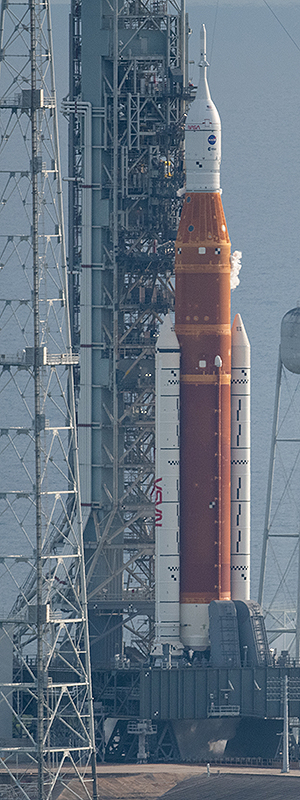 advertisements advertisements
|

|
NASA scrubs first Artemis I launch attempt due to rocket engine issue
Artemis I mission coverage presented with the support of

August 29, 2022 — An issue with cooling a rocket engine forced NASA to call off its first attempt at launching a spacecraft on a test flight to the moon.
Launch director Charlie Blackwell-Thompson, leading a team of flight controllers inside the Launch Control Center (LCC) at NASA's Kennedy Space Center in Florida, called the scrub at 8:34 a.m. EDT (1224 GMT) on Monday (Aug. 29) after the Artemis I countdown had entered an unplanned hold at T-minus 40 minutes. Engineers ran out of time while troubleshooting the problem, which involved the flow of super-chilled liquid hydrogen into four rocket engines to bring them to the proper temperature for launch.
"We don't launch until it's right," NASA Administrator Bill Nelson said in a televised interview with mission commentator Derrol Nail after the launch was delayed. "They've got a problem with the gasses going on with the engine bleed on one engine."
NASA had been counting down to the liftoff of its first Space Launch System (SLS) rocket with an uncrewed Orion spacecraft on a 42-day mission to orbit the moon and return to Earth. The Artemis I mission is the first step towards NASA returning astronauts to the lunar surface before heading on to Mars.
As a planned course of action during the countdown, launch controllers were set to condition the SLS's core stage engines — four RS-25 engines repurposed from the space shuttle program — by increasing pressure on their liquid hydrogen tank to bleed some of the cryogenic propellant to the engines to get them to the proper temperature range needed at ignition.
On Monday, one of the four engines (no. 3, serial number 2058) was not properly conditioned even after the liquid hydrogen tank was fully pressurized. Engineers asked for additional time to work the problem, leading to the countdown entering an unplanned hold at T-40 minutes.
With only a two-hour window to launch and with the countdown already running as much as an hour behind as a result of weather and other issues earlier in the day, Blackwell-Thompson had no choice but to call the scrub.
NASA had intended to test conditioning the engines during a fueling test held in June, but a leak in the line bleeding liquid hydrogen to the engines prevented the trial from proceeding. NASA repaired the leak before the launch attempt, but was unaware of the issue with engine no. 3 until the countdown was underway.
The issue was first reported at about T-minus 2 hours to launch, which had been scheduled for 8:33 a,.m. EDT (1223 GMT).
"It's just illustrative that this is a complicated machine, a very complicated system," said Nelson. "You don't want to 'light the candle' until it is ready to go."
Rather than begin off-loading the liquid hydrogen and liquid oxygen from the core stage tanks, as would be typical after a scrub, Blackwell-Thompson had her team maintain the condition of the SLS so more data could be collected.
"They are taking an opportunity while that vehicle is still fueled up to work this problem. They will get to the bottom of it, they will get it fixed and then we will fly," Nelson said.
The next available opportunity to launch the Artemis I mission is at 12:48 p.m. EDT on Friday (Sept. 2), but that is only if the engine bleed issue can be corrected by then. |
|

NASA’s Space Launch System (SLS) rocket and Artemis I Orion spacecraft are seen at Launch Pad 39B, Monday, Aug. 29, 2022, at Kennedy Space Center in Florida. (NASA/Joel Kowsky) |
collectSPACE is grateful to film and TV company Haviland Digital for supporting our Artemis I coverage. Their team has produced and supported titles such as the award-winning "Last Man on the Moon," "Mission Control: The Unsung Heroes of Apollo" and "Armstrong." |
|

© collectSPACE. All rights reserved.
|
|

|

|
